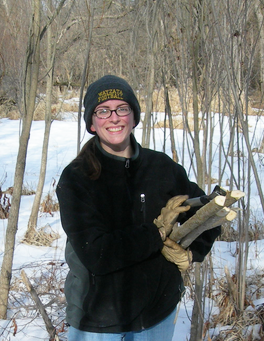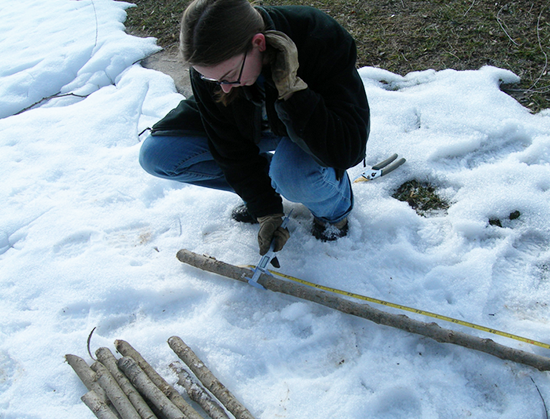Posted 9:05 a.m. Thursday, May 22, 2014

Graduate student Amber Miller received a National Science Foundation’s Graduate Research Fellowship to develop a strategy to restore ecosystems dominated by invasive species.
 UW-L graduate student Amber Miller.[/caption]
Amber Miller recalls the day she learned her despise of invasive species.
She was an intern lugging a chainsaw and herbicide up a bluff to cut down honeysuckle and buckthorn with the Mississippi Valley Conservancy. Simply cutting the pesky plants wasn’t enough. They would re-sprout with vengeance.
“And then I learned you can go out and buy honeysuckle at the nursery,” she says. “Sadly, my mother lost her honeysuckle bush after that.”
Today Miller, a UW-L graduate student in biology, continues her fight with invasive species. But she’s adding a bit of brains to her brawn.
Miller received a National Science Foundation Graduate Research Fellowship to develop a strategy to restore ecosystems dominated by invasive species. She will receive a three-year stipend, plus tuition and fees.
“This is an extremely competitive program,” says Meredith Thomsen, associate professor of biology. “The students chosen for this award are regarded as showing great potential as science professionals.”
Miller’s fellowship starts this summer. She is already at work on Goose Island where an invasive species — reed canarygrass — has taken over the floodplain forest. She wants to provide land managers a system to restore the natural ecosystem effectively at the lowest possible cost. And she aims to find a strategy applicable to all invaded ecosystems.
“Invasive species are a problem everywhere, and they will continue to be a problem,” says Miller. “It’s fascinating to me to think about how to work around these plants.”
[caption id="attachment_34414" align="alignleft" width="550"]
UW-L graduate student Amber Miller.[/caption]
Amber Miller recalls the day she learned her despise of invasive species.
She was an intern lugging a chainsaw and herbicide up a bluff to cut down honeysuckle and buckthorn with the Mississippi Valley Conservancy. Simply cutting the pesky plants wasn’t enough. They would re-sprout with vengeance.
“And then I learned you can go out and buy honeysuckle at the nursery,” she says. “Sadly, my mother lost her honeysuckle bush after that.”
Today Miller, a UW-L graduate student in biology, continues her fight with invasive species. But she’s adding a bit of brains to her brawn.
Miller received a National Science Foundation Graduate Research Fellowship to develop a strategy to restore ecosystems dominated by invasive species. She will receive a three-year stipend, plus tuition and fees.
“This is an extremely competitive program,” says Meredith Thomsen, associate professor of biology. “The students chosen for this award are regarded as showing great potential as science professionals.”
Miller’s fellowship starts this summer. She is already at work on Goose Island where an invasive species — reed canarygrass — has taken over the floodplain forest. She wants to provide land managers a system to restore the natural ecosystem effectively at the lowest possible cost. And she aims to find a strategy applicable to all invaded ecosystems.
“Invasive species are a problem everywhere, and they will continue to be a problem,” says Miller. “It’s fascinating to me to think about how to work around these plants.”
[caption id="attachment_34414" align="alignleft" width="550"] UW-L graduate student Amber Miller took her first trip out to Goose Island to plot out her planting in mid-March. Her work through a highly-competitive National Science Foundation Grant will contribute to knowledge about how to improve the environmental quality of the region, and beyond.[/caption]
Miller aims to get rid of invasive species by applying a theory called applied nucleation. It involves removing the invasive plant and establishing small sections of native trees in its place. In theory, once these islands of trees are established to grow on their own, they can become a natural haven for other native flora and fauna to take root and spread.
She is hopeful applied nucleation will work at Goose Island and could be applied to other invasive species.
Eliminating invasive species will mean more than improving the landscape. It can also improve the overall health of ecosystems and the U.S. economy. Invasive species cost the U.S. billions of dollars in damages every year. Spreading of invasive plants and animals negatively affects property values, agricultural productivity, public utility operations, native fisheries, tourism and outdoor recreation, according to the U.S. Fish and Wildlife Service.
Specifically, Miller’s research is helping with the U.S. Army Corps of Engineers' mission of environmental stewardship of roughly 25,000 acres of floodplain forest the corps manages on behalf of the public, says Randy Urich, environmental sections manager for the U.S. Army Corps of Engineers.
Reed canarygrass has the potential to convert forested habitat managed by the corps into grassland — outcompeting other plants, and replacing native habitats important to wildlife. Goose Island is especially important for birds that use the floodplain forest as their migratory flyway.
“What Amber is doing is really helping us to narrow down the management choices and find those that would be most successful in restoring habitats,” he says.
McNair Scholars Program and First Year Research Experience students from UW-L will be helping Miller in the field. Both programs aim to increase the participation of underrepresented groups in the sciences (FYRE) and in academia more generally (McNair.)
“Providing that experience as soon as possible is only going to help grow the scientific community,” says Miller.
Miller’s research is in collaboration with the U.S. Army Corps of Engineers and the Upper Midwest Environmental Science Center.
UW-L graduate student Amber Miller took her first trip out to Goose Island to plot out her planting in mid-March. Her work through a highly-competitive National Science Foundation Grant will contribute to knowledge about how to improve the environmental quality of the region, and beyond.[/caption]
Miller aims to get rid of invasive species by applying a theory called applied nucleation. It involves removing the invasive plant and establishing small sections of native trees in its place. In theory, once these islands of trees are established to grow on their own, they can become a natural haven for other native flora and fauna to take root and spread.
She is hopeful applied nucleation will work at Goose Island and could be applied to other invasive species.
Eliminating invasive species will mean more than improving the landscape. It can also improve the overall health of ecosystems and the U.S. economy. Invasive species cost the U.S. billions of dollars in damages every year. Spreading of invasive plants and animals negatively affects property values, agricultural productivity, public utility operations, native fisheries, tourism and outdoor recreation, according to the U.S. Fish and Wildlife Service.
Specifically, Miller’s research is helping with the U.S. Army Corps of Engineers' mission of environmental stewardship of roughly 25,000 acres of floodplain forest the corps manages on behalf of the public, says Randy Urich, environmental sections manager for the U.S. Army Corps of Engineers.
Reed canarygrass has the potential to convert forested habitat managed by the corps into grassland — outcompeting other plants, and replacing native habitats important to wildlife. Goose Island is especially important for birds that use the floodplain forest as their migratory flyway.
“What Amber is doing is really helping us to narrow down the management choices and find those that would be most successful in restoring habitats,” he says.
McNair Scholars Program and First Year Research Experience students from UW-L will be helping Miller in the field. Both programs aim to increase the participation of underrepresented groups in the sciences (FYRE) and in academia more generally (McNair.)
“Providing that experience as soon as possible is only going to help grow the scientific community,” says Miller.
Miller’s research is in collaboration with the U.S. Army Corps of Engineers and the Upper Midwest Environmental Science Center.
